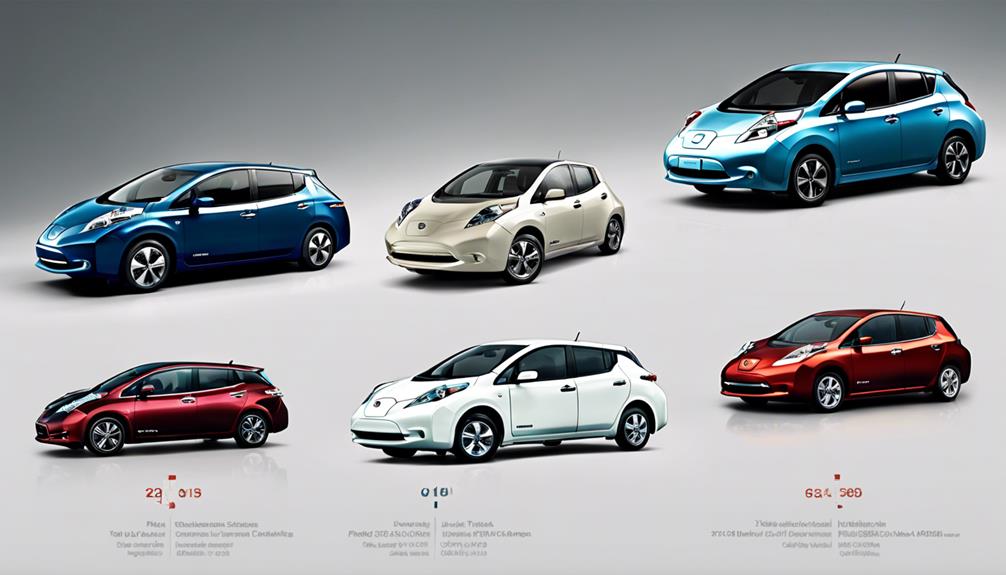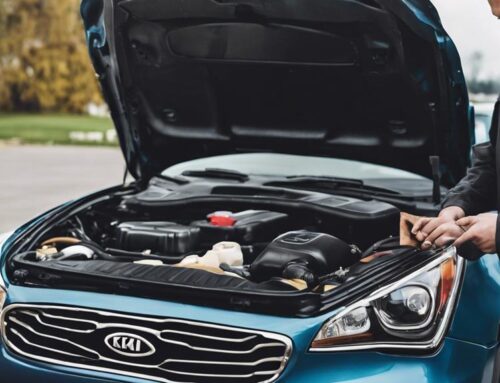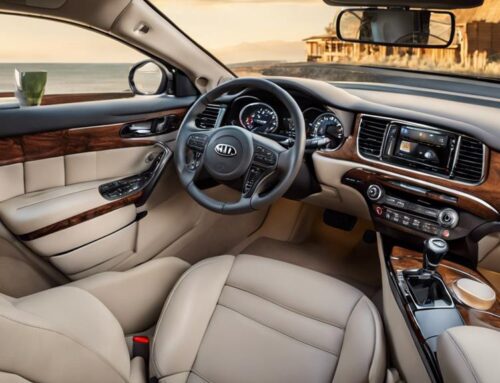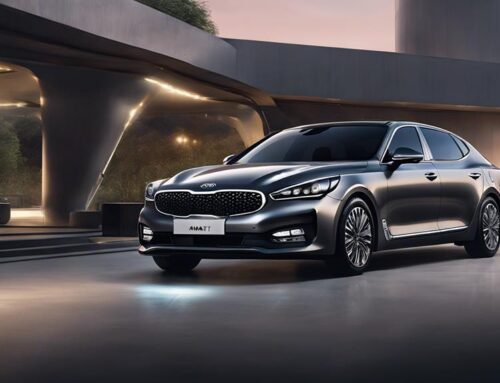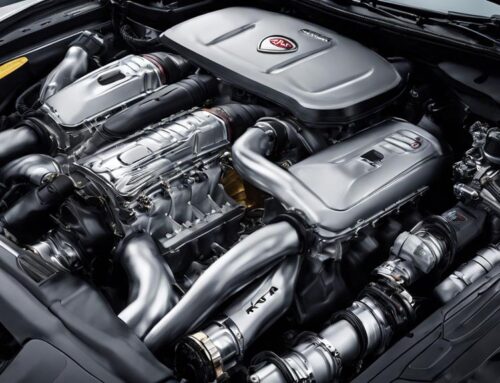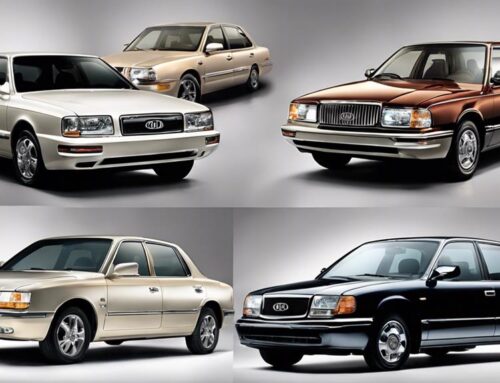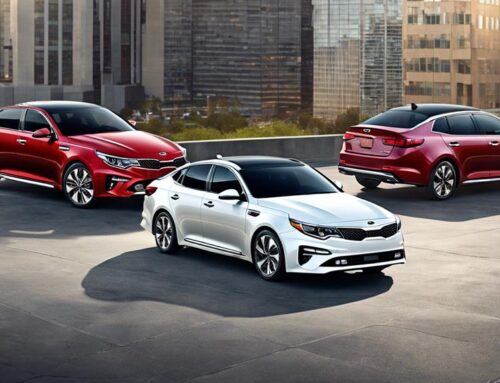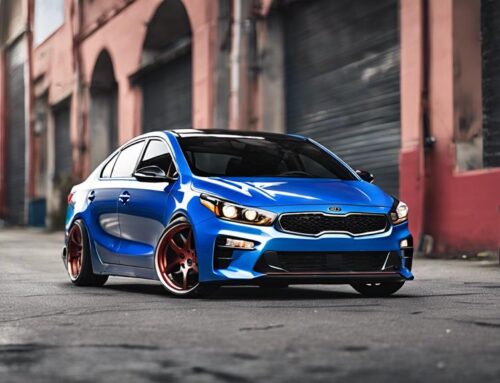The Nissan Leaf has transformed remarkably since its 2010 debut. Initially featuring a 24 kWh battery with a 73-mile range, it now offers a 62 kWh battery in the Leaf Plus for up to 226 miles. Key updates include the 2018 introduction of the e-Pedal for one-pedal driving and ProPILOT Assist for semi-autonomous control. Performance enhancements like increased torque, intelligent thermal management, and rapid charging capabilities reflect Nissan's focus on innovation. With sleek design improvements and advanced keyless entry systems, the Leaf continues to set industry benchmarks. You'll discover even more exciting specifics as you explore further.
Key Takeaways
- The Nissan Leaf's range increased from 73 miles in 2010 to 226 miles with the 62 kWh battery in 2019.
- Key technological advancements include the introduction of ProPILOT Assist and e-Pedal for improved driving experience.
- Battery capacity evolved from 24 kWh in 2010 to 62 kWh in 2019, enhancing range and performance.
- Design updates focused on aerodynamic efficiency, modern aesthetics, and advanced infotainment systems.
- Fast-charging capabilities improved, allowing up to 80% charge in about 30-40 minutes.
First Generation Nissan Leaf
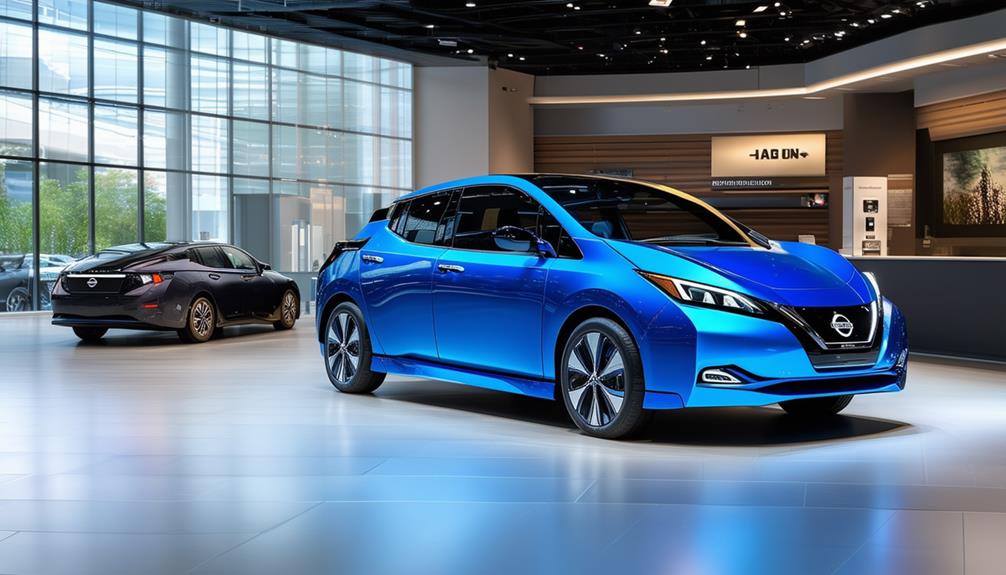
Although the electric vehicle market has seen remarkable advancements, the First Generation Nissan Leaf holds a pivotal place in automotive history. As an early pioneer in the mass-market EV segment, the Leaf set the stage for what you see today regarding battery range and charging infrastructure. Let's immerse ourselves in the technical details that made this vehicle groundbreaking.
The First Generation Nissan Leaf, which debuted in 2010, featured a 24 kWh lithium-ion battery pack. This battery offered an EPA-rated range of approximately 73 miles per charge. While this might seem modest by today's standards, it was revolutionary at the time, providing enough range for most daily commutes. The Leaf's battery range was a critical factor in its initial adoption, proving that electric vehicles could meet everyday driving needs.
Charging infrastructure was another area where the First Generation Leaf made significant strides. Equipped with a standard 3.3 kW onboard charger, the Leaf could be recharged using a Level 1 or Level 2 charging station. A full charge using a Level 2 station took about 8 hours, aligning well with overnight charging routines.
Additionally, the Leaf was one of the first vehicles to offer a CHAdeMO DC fast-charging port, allowing for an 80% charge in about 30 minutes, greatly enhancing long-distance travel feasibility.
The First Generation Nissan Leaf's focus on practical battery range and the development of robust charging infrastructure laid the groundwork for the future of electric vehicles. It demonstrated that EVs could be more than just a niche product, paving the way for the broader adoption you witness today.
Second Generation Updates
Building upon the groundwork laid by its forerunner, the Second Generation Nissan Leaf introduced in 2017 marked a notable leap forward in the electric vehicle landscape. The most remarkable upgrade was its enhanced battery range. You'll appreciate that the new 40 kWh lithium-ion battery substantially extended the range to approximately 150 miles on a single charge, a noteworthy improvement from the first generation's 107 miles. This enhancement addressed one of the primary concerns for potential EV owners: range anxiety.
Technological advancements didn't stop there. Nissan integrated the e-Pedal feature, allowing you to accelerate and decelerate using just one pedal, revolutionizing the driving experience and adding a layer of convenience. The ProPILOT Assist system also debuted, offering semi-autonomous driving capabilities that can control acceleration, braking, and steering during single-lane highway driving. These innovations underscore Nissan's commitment to pushing the boundaries of what an electric vehicle can achieve.
The Second Generation Leaf also solidified its position in the electric vehicle landscape, emphasizing both performance and technological prowess.
Charging infrastructure was another area where Nissan made notable strides. The second-generation Leaf featured support for CHAdeMO quick charging, enabling you to recharge the battery up to 80% in about 40 minutes. Additionally, Nissan collaborated with various stakeholders to expand the network of public charging stations, making long-distance travel more feasible and alleviating concerns about finding a charging point on the go.
With an eye on sustainability and innovation, the Second Generation Nissan Leaf set new benchmarks in the EV market. It balanced increased performance, advanced driving aids, and improved charging infrastructure, making it a compelling choice for modern drivers keen to embrace the future of transportation.
Notable Model Year Changes
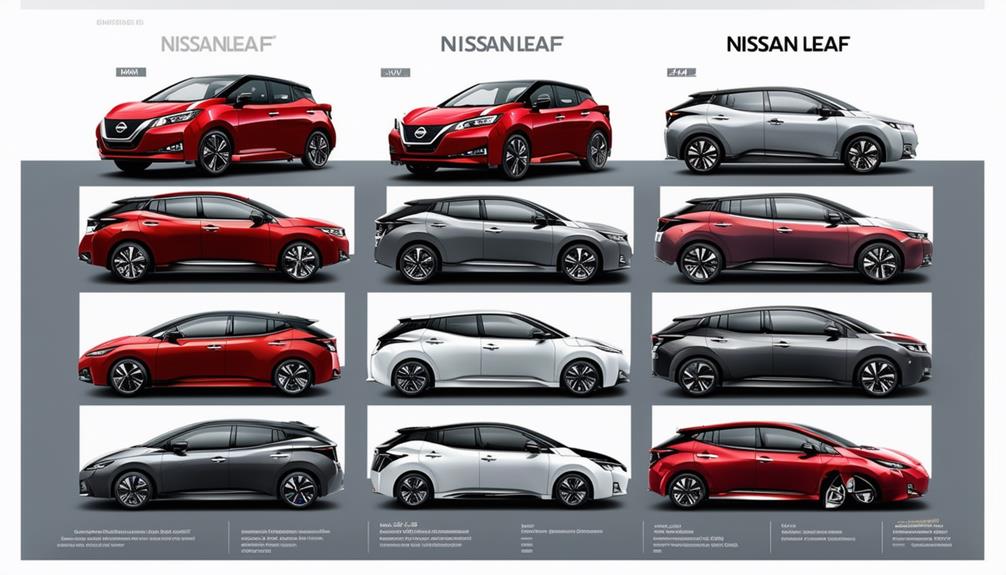
As you explore the notable model year changes of the Nissan Leaf, you'll see how each iteration brought significant enhancements to the electric vehicle landscape. From the 2011 debut to the latest models, Nissan has consistently pushed the envelope in range improvements and battery capacity.
In 2013, the Leaf saw its first substantial upgrade with a 24 kWh battery, extending its range to approximately 75 miles, a leap from the initial 73 miles. By 2016, the introduction of a 30 kWh battery further pushed the range to 107 miles, signaling Nissan's dedication to enhancing battery capacity and overall efficiency.
The 2018 model year was a turning point, marking the arrival of the second-generation Leaf. This version featured a 40 kWh battery, boosting the range to 150 miles. The exterior updates included a more aerodynamic design, revamped front fascia, and sleek LED headlights. Inside, the interior features were upgraded with a more intuitive infotainment system and enhanced driver-assist technology, aligning with the growing demand for connected and smart vehicles.
In 2019, Nissan introduced the Leaf Plus, boasting a 62 kWh battery that extended the range to an impressive 226 miles. This model also offered more powerful electric motors, enhancing overall performance while retaining the advanced interior features and exterior updates of its predecessor.
Each year, Nissan has made incremental yet impactful changes, focusing on range improvements and elevating both the exterior and interior aspects of the Leaf. This dedication to innovation guarantees that the Nissan Leaf remains a frontrunner in the electric vehicle market, continually setting new standards for what an electric car can achieve.
Performance Enhancements Over Time
Performance enhancements over time have solidified the Nissan Leaf's position as a trailblazer in the electric vehicle market. You're witnessing an evolution that showcases Nissan's commitment to staying ahead of the curve.
Early models of the Leaf, introduced in 2010, featured a modest range of around 73 miles per charge. Fast forward to the current generation, and you'll see substantial range improvements, with the 2023 Nissan Leaf Plus boasting a range of up to 226 miles. This significant leap is primarily due to advancements in battery technology, allowing you to travel further without frequent recharges. The latest models also feature advanced safety systems like smart entry and anti-theft technologies, ensuring both performance and security.
Acceleration upgrades have also played a pivotal role in the Leaf's performance evolution. The initial models, while sufficient for city driving, lacked the punch needed for swift overtaking on highways. Modern iterations have addressed this, featuring electric motors that deliver more torque and power.
For example, the 2023 Leaf Plus can accelerate from 0 to 60 mph in approximately 7.5 seconds, a notable improvement over earlier versions. This makes the Leaf not just an eco-friendly option but also a practical one for a variety of driving scenarios.
Moreover, Nissan has integrated advanced regenerative braking systems, enhancing energy efficiency and overall driving dynamics. These systems capture more kinetic energy during braking, feeding it back into the battery and thereby extending the vehicle's range. This dual focus on range improvements and acceleration upgrades underscores Nissan's holistic approach to performance.
Design Evolution
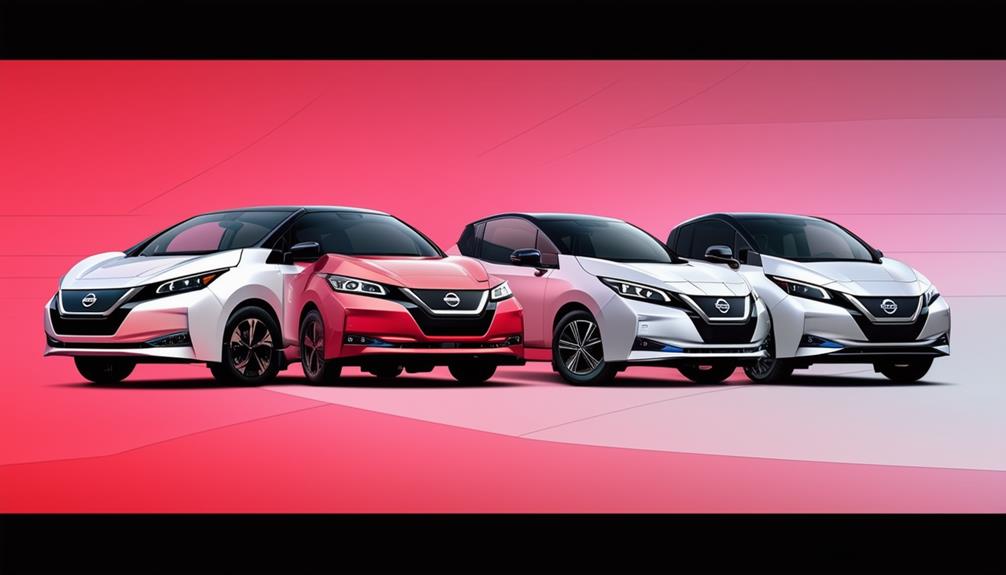
Every iteration of the Nissan Leaf has introduced refinements in design, showcasing both aesthetic and functional advancements that cater to the evolving preferences and needs of electric vehicle enthusiasts. The vehicle's evolution in exterior redesigns emphasizes aerodynamic efficiency and modern aesthetics. The original Leaf, with its distinctive rounded shape, set a precedent for electric vehicle design. However, as consumer preferences shifted towards more streamlined profiles, Nissan responded with sleeker and more aggressive lines in subsequent models. Importantly, the infotainment system has also seen significant advancements, offering drivers a more connected and enjoyable experience.
The second-generation Leaf, launched in 2017, is a proof of Nissan's commitment to innovation. It featured a V-motion grille, boomerang-shaped LED headlights, and a floating roof design. These elements not only provided a futuristic appearance but also improved aerodynamic performance, reducing drag and increasing range. The incorporation of sharp edges and an overall more robust stance demonstrated a clear departure from the rounded shapes of the first generation.
Inside, the Leaf has seen notable interior upgrades aimed at enhancing driver and passenger experience. Early models were functional but somewhat minimalist, reflecting the early stage of the electric vehicle market. Over time, Nissan integrated more premium materials, user-friendly layouts, and advanced ergonomics. The latest models boast a redesigned cabin space with high-quality finishes, a digital instrument cluster, and an infotainment system that seamlessly integrates with modern smart technologies.
Furthermore, the interior upgrades have focused on maximizing space and comfort. Enhanced seating materials, improved sound insulation, and customizable ambient lighting create an inviting atmosphere, making the Leaf not only an eco-friendly choice but also a luxurious one. By consistently refining both exterior redesigns and interior upgrades, Nissan has guaranteed the Leaf remains at the forefront of the electric vehicle market.
Technology Improvements
While Nissan has made significant progress in design and comfort, the technological advancements in the Nissan Leaf models are just as impressive. If you're interested in staying ahead of the curve, you'll appreciate how Nissan has integrated cutting-edge tech to redefine the driving experience.
One of the major breakthroughs is the ProPILOT Assist system. This semi-autonomous driving feature keeps you centered in your lane, maintains a set distance from the car ahead, and can even bring you to a complete stop. This technology remarkably reduces driver fatigue and enhances safety.
To address range anxiety, Nissan has implemented an advanced e-Pedal feature. This innovation allows you to accelerate, decelerate, and come to a complete stop using just one pedal, which not only simplifies driving but also maximizes regenerative braking to extend your range.
In terms of connectivity, the latest Nissan Leaf models boast an upgraded infotainment system. The 8-inch touchscreen display is now more intuitive and responsive, offering seamless integration with Apple CarPlay and Android Auto. This ensures you stay connected, entertained, and informed while on the road.
Additionally, Nissan has improved the Leaf's energy management systems. The integration of intelligent thermal management helps maintain the best battery temperature, ensuring superior performance and longevity.
Here's a quick rundown of these technological innovations:
- ProPILOT Assist: Semi-autonomous driving for enhanced safety.
- e-Pedal: Simplifies driving and maximizes regenerative braking.
- Infotainment System: An intuitive 8-inch touchscreen with smartphone integration.
- Energy Management: Intelligent thermal management for top battery performance.
These advancements demonstrate Nissan's commitment to innovation, guaranteeing that the Leaf remains a frontrunner in the electric vehicle market.
Battery Upgrades Through the Years
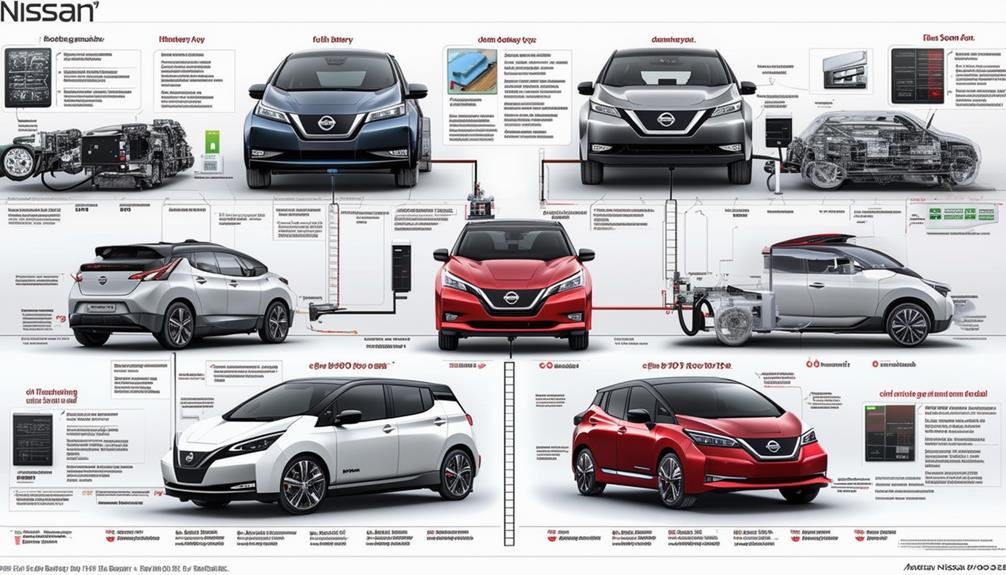
Over the years, Nissan has continually upgraded the Leaf's battery technology, setting new industry standards in electric vehicle performance and efficiency. As an enthusiast for innovation, you'll appreciate how these advancements have addressed range anxiety, a common concern for EV drivers.
When the Nissan Leaf debuted in 2010, it featured a 24 kWh lithium-ion battery, promising a modest range of approximately 73 miles. While this was groundbreaking at the time, the need for improved range and charging infrastructure quickly became apparent. By 2013, Nissan responded with enhancements to the battery chemistry, extending the range marginally and improving durability. Proactive maintenance can greatly enhance battery longevity, as noted by real-life ownership experiences of Nissan Leaf drivers.
The real game-changer came in 2016 with the introduction of a 30 kWh battery, pushing the range to about 107 miles. This upgrade alleviated some range anxiety, but Nissan wasn't done yet. In 2018, the Leaf Plus model arrived, sporting a 40 kWh battery that extended the range to 151 miles, showcasing Nissan's dedication to continuous improvement.
Recognizing that charging infrastructure plays a pivotal role in the EV ecosystem, Nissan also focused on reducing charging times. The introduction of the 62 kWh battery in 2019 was a notable leap forward, providing a range of up to 226 miles. This made long-distance travel more feasible and further reduced range anxiety.
The latest models come equipped with advanced thermal management systems, ensuring peak battery performance even in extreme conditions. Nissan's integration of fast-charging capabilities has also evolved, allowing you to charge up to 80% in just 40 minutes at compatible fast-charging stations.
Keyless Innovations
A hallmark of modern automotive convenience, keyless innovations in the Nissan Leaf have elevated the driving experience by integrating cutting-edge technology with user-friendly features. These advancements don't just add flair; they redefine how you interact with your vehicle, making every journey seamless and more secure.
Nissan's smart features enable you to open and start your Leaf without ever needing to reach for your keys. The Intelligent Key system uses sensors to detect the key fob, allowing you to access the doors with a simple touch. This feature is particularly useful when your hands are full, enhancing both convenience and accessibility.
Remote access is another game-changer. Through the NissanConnect app, you can secure and access your car, start the engine, and even control the climate settings from your smartphone. This level of remote control guarantees your Leaf is always ready to go, tailored to your preferred settings, no matter where you are. Additionally, for those who find themselves in need of replacements, Nissan key replacements are readily available, covering transponder, fobs, smart keys, and push-to-start systems.
Here are some standout keyless innovations in the Nissan Leaf:
- Proximity Sensors: Automatically detect the key fob to access doors as you approach.
- Push-Button Start: Ignite the engine with just a button press, eliminating the need for a traditional key.
- NissanConnect App: Provides full remote access to secure/unlock, start the car, and adjust climate settings.
- Enhanced Security: Advanced encryption and communication protocols guarantee that only authorized users can access the vehicle.
These innovations exemplify Nissan's commitment to blending advanced technology with practical, everyday usability. By focusing on smart features and remote access, the Nissan Leaf continues to set benchmarks in the electric vehicle market, offering you a driving experience that's both sophisticated and effortless.
Consumer Reception by Year
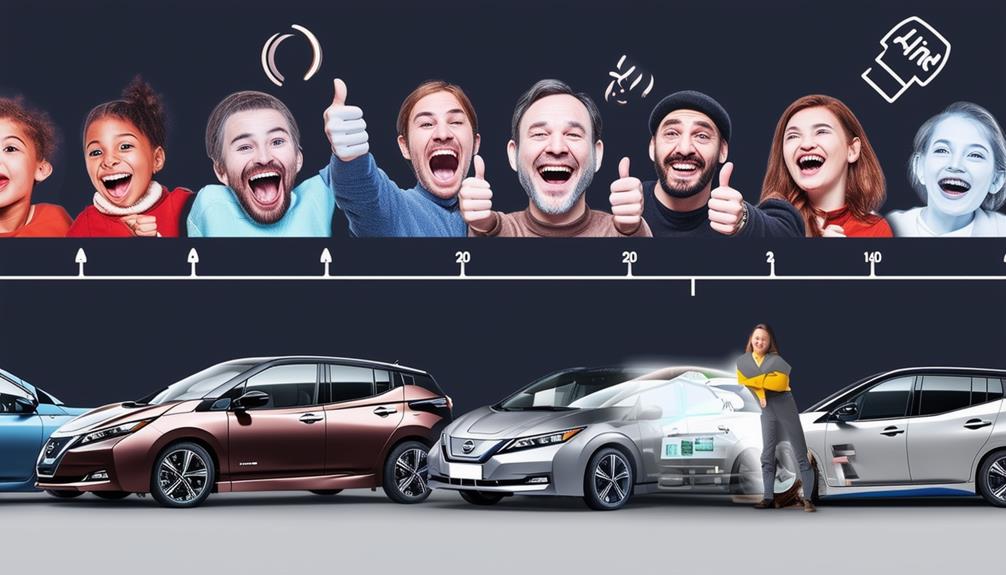
By examining consumer reception year by year, you can gain valuable insights into how the Nissan Leaf has been perceived in the market. When it debuted in 2010, the Nissan Leaf was lauded as a groundbreaking step in the electric vehicle (EV) sector. Early adopters praised its environmental impact, noting the significant reduction in greenhouse gas emissions. However, market demand was initially tempered by concerns over charging infrastructure and range anxiety.
In the subsequent years, user feedback highlighted the need for extended range and quicker charging times. Nissan responded by upgrading the battery capacity, thereby improving the Leaf's range. By 2013, the market began to see an uptick in demand, driven by improvements in charging infrastructure and a broader acceptance of EVs.
Moving into 2015, consumer reception was positively influenced by enhancements in interior comfort and advanced driver-assist features. The Leaf's environmental impact continued to be a strong selling point, particularly for eco-conscious buyers. Additionally, user feedback emphasized satisfaction with the improved range and reliability. Issues like software glitches and key fob problems were also noted, prompting Nissan to address these in subsequent updates.
In 2018, the introduction of the second-generation Leaf marked a significant leap in market demand. The new model offered a more powerful battery and an extended range, which addressed prior concerns. Enhanced charging infrastructure also made it easier for consumers to integrate an EV into their daily lives.
Future Model Predictions
Looking ahead, future Nissan Leaf models are expected to incorporate cutting-edge advancements in battery technology, driving further improvements in range and efficiency. As electric vehicle (EV) technology continues to evolve, Nissan aims to stay at the forefront of innovation, ensuring that the Leaf remains a competitive choice for eco-conscious drivers. Additionally, owners will find it easier to personalize and improve their driving experience with a variety of stylish accessories.
The next generation of Nissan Leaf will likely feature significant distance enhancements. Enhanced battery chemistry and energy density will enable longer driving distances on a single charge, addressing one of the most important concerns for EV owners. Expect to see distances that comfortably exceed 300 miles, making long trips more feasible without frequent recharging stops.
In addition to distance improvements, future models will integrate advanced self-driving features. Building on Nissan's ProPilot Assist system, upcoming Leafs will offer more sophisticated autonomous capabilities, including:
- Enhanced lane-keeping: More precise lane centering and smoother adjustments between lanes during automated driving.
- Adaptive cruise control: Improved algorithms for better handling in varying traffic conditions, ensuring ideal speed adjustments.
- Intersection management: Advanced sensors and AI to navigate complex urban intersections with minimal driver intervention.
- Parking automation: Fully automated parking solutions that can handle parallel and perpendicular parking effortlessly.
These innovations underscore Nissan's commitment to safety, convenience, and the overall driving experience. Additionally, connectivity will play an optimal role. Future models are expected to feature more seamless integration with smart home devices and other IoT systems, allowing you to monitor and control charging, climate settings, and more from your smartphone.
Frequently Asked Questions
How Does the Nissan Leaf Compare to Other Electric Vehicles in Its Price Range?
You'll find the Nissan Leaf's performance comparison favorable in its price range. It excels in charging infrastructure and mitigates range anxiety. However, battery degradation remains a concern, impacting long-term appeal compared to other electric vehicles.
What Are the Safety Ratings for Various Nissan Leaf Models?
You'll find that the Nissan Leaf models consistently score high in crash test ratings. They come with impressive warranty coverage, ensuring peace of mind. It's an innovative choice for safety-conscious drivers in the electric vehicle market.
How Does the Leaf's Resale Value Hold up Over Time?
Imagine watching a leaf fall slowly. The Nissan Leaf's resale value follows a similar path, with a moderate depreciation rate. Compared to other electric vehicles, it aligns well with market trends, maintaining stability in resale value.
Are There Any Common Issues or Recalls Associated With the Nissan Leaf?
You'll find recall concerns primarily related to the braking system and airbag sensors. Common issues include battery degradation over time. Keep an eye on software updates and maintenance to mitigate these challenges and maximize performance.
What Is the Typical Maintenance Schedule for a Nissan Leaf?
You should follow a maintenance schedule that includes routine checks on battery life and warranties, along with regular inspections of the charging infrastructure. This guarantees peak performance and longevity, aligning with the innovative approach Nissan Leaf owners anticipate.
Conclusion
Imagine you're driving the first generation Nissan Leaf, feeling like you're in a quaint, charming small town. Fast forward to today's model and it's like you've arrived in a bustling, innovative city. The Leaf's evolution mirrors this journey, with each upgrade—whether it's battery range or keyless features—paving the way. Consumer reception has been a proof to its growth. As we look to the future, expect Nissan to keep pushing boundaries, driving toward a smarter, greener horizon.

